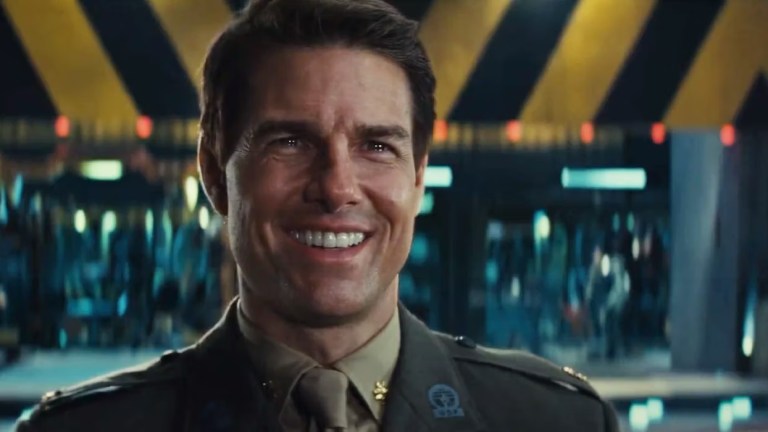Edge of Tomorrow Is the Anti-Tom Cruise Movie
Edge of Tomorrow might star Tom Cruise, but the sci-fi action movie works by undermining everything we know about America's greatest movie star.

Here is the plot of every Tom Cruise movie: Tom Cruise is awesome. Some people think that Tom Cruise isn’t awesome. Tom Cruise does something awesome. Everyone now knows that Tom Cruise is awesome. Just plug in a few character names and occupations, and you’ve can summarize Top Gun, The Color of Money, Cocktail, Jerry Maguire, and more.
Maverick is awesome, but Iceman doesn’t believe him until Maverick does something awesome and now Iceman knows. Vincent Lauria is awesome, but Fast Eddie doesn’t believe him until Vincent does something awesome and now Fast Eddie knows. Jerry Maguire is awesome, but Dorothy doesn’t believe him until Jerry does something awesome and now she knows. Ethan Hunt is awesome, but… well everyone knows. And so it goes.
Sure, there are outliers, but that’s the standard Tom Cruise plot. Which is one of the key reasons his turn in Edge of Tomorrow is spectacular. This time loop movie from director Doug Liman is all about how Tom Cruise is the only person on Earth who knows that this Tom Cruise isn’t awesome. It’s the standard plot.
At the start of Edge of Tomorrow, Tom Cruise is introduced as a high-ranking military officer in a united human army’s battle against aliens (or “mimics”). He’s the smiling public relations-fronting face of the United Defense Force (UDF), and he is all over the television to convincingly talk up the military prowess of a soldier called “Vrataski.” According to Cruise, Vrataski is a one-person killing machine who just turned the tide of the war against our alien invaders.
This Vrataski sounds pretty damn cool, but despite what previous movies might have taught us, Cruise does not play Vrataski. Rather it is Emily Blunt who portrays Sgt. Rita Vrataski, aka the Angel of Verdun, the hard-bitten leader in the UDF. Instead Cruise plays Maj. William Cage who, hardcore name notwithstanding, is simply a public affairs officer, not a proper soldier. Cage fights the battle of public opinion instead of the battle of Verdun. He’s a salesman who belongs with his fellow ad men taking long lunches at 5th Avenue, not trench warfare at the front. Nonetheless, he gets sent to that very front, a consequence of his attempt to blackmail a superior. Cage is punished by his general because the Cruise character is revealed to not be the handsome sonofabitch hero on TV. He turns out to be a coward, and is asked to die for it. And when that seeming death inevitably comes, he runs away until he accidentally uses a mine to kill a mimic… and himself.
Of course that’s only the beginning of the story, not the end. Based on the manga All You Need Is Kill by Hiroshi Sakurazaka, and adapted for the screen by Christopher McQuarrie and brothers Jez and John-Henry Butterworth, Edge of Tomorrow follows a time-loop structure, as made famous by Groundhog Day. Between the explosion and the alien blood, Cage’s death now causes him to wake up 24 hours earlier when he first gets shipped to the front. Liman highlights the difference in his approach to Cruise’s screen persona with the way he shoots Cage’s arrival among the egrunts. As he prepares to jump into battle, Cage has a look of slack-jawed terror, a far more ignoble expression than the frustration and even exasperation that Ethan Hunt registers when a plan goes wrong in Mission: Impossible. The camera stays with Cage as he plummets through the chaos, waving his arms while soldiers and aircraft crash and explode around him. Instead of breaking into his signature determined run when he hits the ground, Cage fumbles like a giant mechanical baby.
And when he spies a sneak attack, mimics coming up from the ground to surprise UDF forces, Cage’s yelps embarrass more than inspire the soldiers around him. He flails and scrambles, managing to kill a few mimics with the guns he somehow turned on, before killing a giant mimic and himself in an explosion. Thus begins a Sisyphean existence of his life resetting after every death.
But as his commanding officer Sergeant Farrell (a delightful Bill Paxton) explains, there’s hope yet for Cage, in the form of glorious combat. “Battle is the great redeemer,” Farrell declares. “It is the fiery crucible in which true heroes are forged.” Edge of Tomorrow is the story about that redemption. Using the knowledge that he gains from each unsuccessful outing at the front, Cage grows smarter, faster, and braver. He follows the example set by Vrataski and eventually becomes her equal. In Tom Cruise terms, he becomes awesome.
As people who have watched Tom Cruise on screen for decades, we know that he’s awesome and fully expect him to be awesome again. But time and again, Cruise plays against that awesomeness to create a tension that’s not present in the text of Edge of Tomorrow.
Edge of Tomorrow is not the only work to toy with Cruise’s screen persona. In Magnolia, Paul Thomas Anderson turns the actor’s charge into something aggressive and unsettling to play men’s rights advocate Frank TJ Mackey. Oliver Stone’s Born on the Fourth of July uses Cruise’s status as one of America’s up-and-coming leading men to show how the Vietnam War left many bright hopes broken and disgraced. Even a terrible film such as Lions for Lambs understands how to use Cruise (it was, after all, directed by Robert Redford), casting him as a smug politician and proponent of the military industrial complex.
But in each case, the inverse of Cruise’s persona just serves part of the story. In Edge of the Tomorrow, it’s the entire plot. And by drawing from that persona, the film gains greater depth. We believe Cage’s transformation into super soldier because we’ve seen Tom Cruise movies before and we know that Tom Cruise is awesome. Edge of Tomorrow comes to the same conclusion, but it takes its time and has a lot of fun getting there.
Edge of Tomorrow is now streaming on Netflix.


